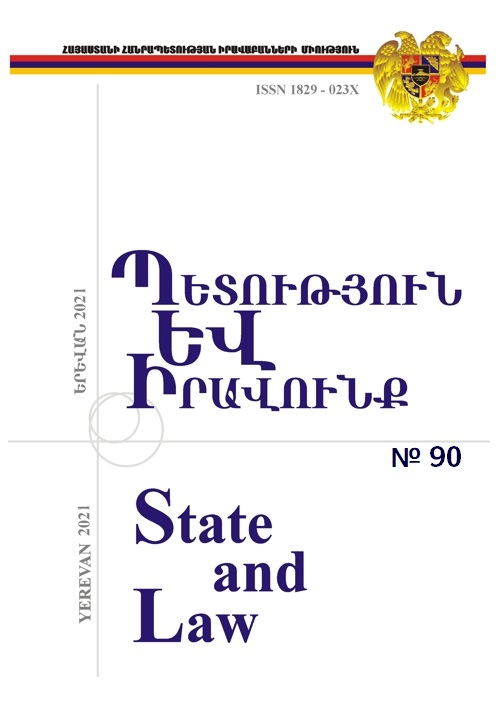CONCEPTUAL FEATURES OF SECRET MEASURES UNDER THE RA NEW CRIMINAL PROCEDURE CODE
Keywords:
secret investigative measures, operational-search measures, criminal procedural activity, subject of initial judicial supervision, restriction of human rights, legitimacy safeguards, scope օf offences, categories of persons, controlled delivery, undercover operation, interception of telecommunicationsAbstract
With the adoption of the new RA Criminal Procedure Code (hereinafter referred to as the New Code), the Armenian legal theory and legal practice are faced with a responsible task of redefining the institutions that have been researched and applied for decades, as the New Code is based on a fundamentally new concept. From this perspective, the study of new regulations on secret measures is highly relevant.
Within this framework, the paper studies the model of secret investigative measures envisaged by the New Code from the conceptual point, reveals the international standards for lawfulness of normative regulation of such measures, discusses some theoretical and practical problems arisen under the previous legal regulations.
As a result of the analysis, it was concluded that by incorporating some of the operative-investigative measures in the Criminal Procedure Code and referring to them as "secret investigative measures", the issue of their legal nature was resolved at the normative level.
Dicussing the criterion for differentiation of secret investigative measures and considering the ECHR case-law and number of international treaties ratified by RA, the author proposes to envisage the controled supply and purchase, as well as the undercover operation as covert investigative measures, making them the subject of initial judicial control. According to the author, this will ensure the use of the results of these measures as evidence, as well as the effective implementation of the commitments undertaken by the RA in the fight against crime in certain spheres.
The author notes that the new regulations, compared to the previous ones, essentially expand the scope of crimes that allow conducting covert investigative measures. In particular, under the new regulations, all covert investigative actions can be carried out in regard of serious or particularly serious, as well as corrupt offenses. In this connection, it was emphasized that the mentioned approach of the New Code is in line with the commitments undertaken by RA in the field of fight against corruption.
In the light of legal practice, the Author has expressed concern about the restricting the access to some of the information contained in the wiretapping content by the scope of serious or particularly serious or corrupt crimes. In particular, the actions under consideration, especially the receiving of information about incoming and outgoing calls of the subscriber, the time of starting and ending the telephone communication, the telephone number to which the telephone call was transferred in case of redirection, are very widely used in relation to other crimes as well.
Referring to the provisions of the New Code on the definition of the categories of persons who can be subjected to secret corrupt, the author concluded that it essentially meets international standards, provides a clear solution to a number of issues that have arisen in practice at the moment. Meantime, the Author notes that in connection with the recording of telephone conversations, the European Court has assessed that the restriction of the right of another person who have information about the crime is lawful, but the New Code, unlike the previous one, precludes that.
As a result of the research, the Author found that a fundamentally new concept of secret actions has been introduced in the RA criminal procedure legislation, which will be able to ensure the rights of a person in a state governed by the rule of law and the public interest in crime detection in a new, qualitatively high level, and its gaps and shortcomings reasonably can be discussed only after practical application.
Published
Issue
Section
License
Copyright (c) 2021 State and Law

This work is licensed under a Creative Commons Attribution-NonCommercial 4.0 International License.

